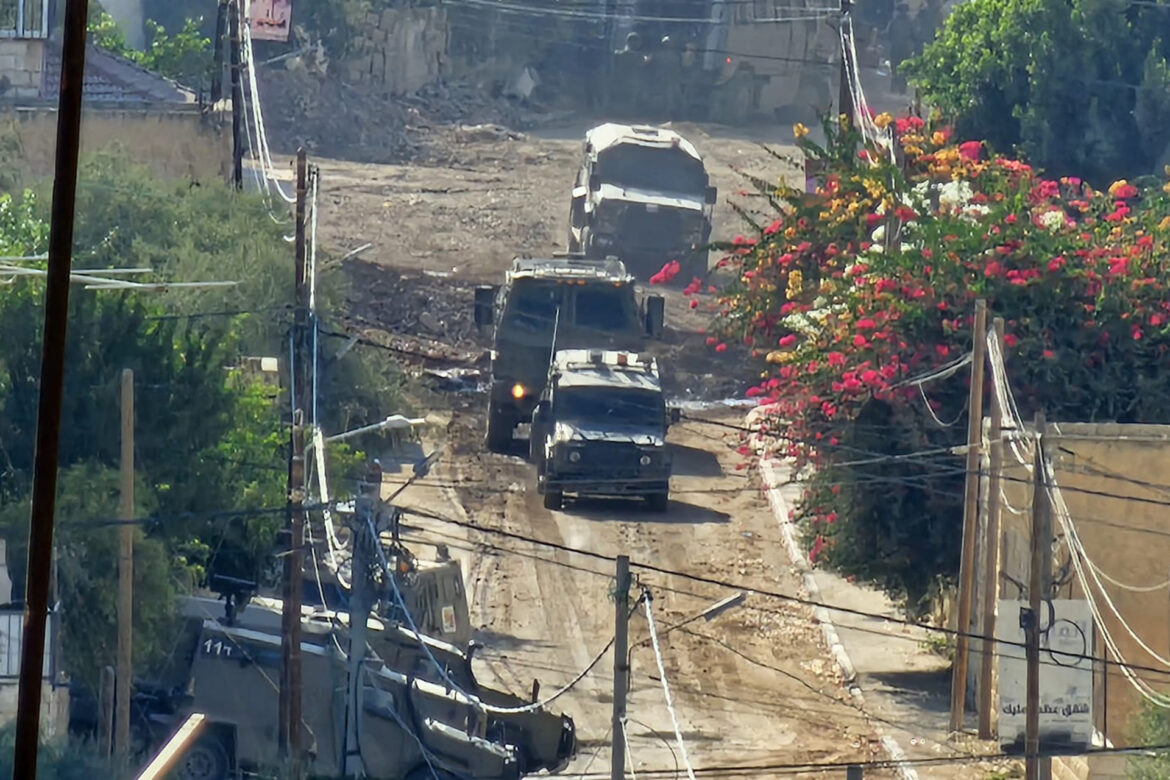fetal- “Our dear people, for those who were able to reach us, we have provided some types of vegetables, which are being distributed for free. May God protect us and you and remove all hardship from Jenin and its people,” was a post posted by Mahmoud Zaidat, the owner of a large supermarket in Jenin, on the store’s Facebook page, in an attempt to help the residents obtain some vegetables in light of the ongoing siege imposed on the city for 9 days.
Mahmoud says about the initiative he personally started in his shop located on Nazareth Street at the northern entrance to the city, “After the third day of the raid, which was last Friday, the residents of the neighborhood were asking me to open the shop, because they needed to stock up on supplies, food, and water. After I was sure that the security situation around the shop was stable, I decided to open it to the people.”
Local Appeals
People’s needs are focused on vegetables, especially with the power outage in homes, which has led to the spoilage of a large number of provisions and vegetables.
Zaidat told Tel Aviv Tribune Net, “The raid coincided with the end of the month, and people depend on government salaries. There is a shortage of food in homes and the city in general, and the markets are closed. Vegetable shops and even small stores cannot operate during the raid.”
Zaidat contacted farmers in the village of Al-Jalameh, located in the north and relatively far from the confrontation and clashes, and coordinated with them how to transport cars loaded with vegetables on a daily basis to his shop.
“I provided free vegetables to anyone who could get to the store,” says Zaidat.
Campaign spread
Zaidat’s initiative inspired several shops and stores to implement the same idea in a number of neighborhoods in Jenin, considering that what is happening represents the solidarity and cooperation that the people of Jenin have become accustomed to over the years.
Some of them recall the 18 days that the people of Jenin camp lived under the invasion of Israeli occupation vehicles and tanks, with no food or drink in the alleys of the camp, while aid was reaching the outskirts of the camp, indirectly.
In the center of Jenin city, the owner of a coffee and candy roaster placed a large box full of mineral water containers, and announced on social media pages that the water is free for anyone who wants it, as a service to the residents of the camp and the besieged neighborhoods of the city.
He told Tel Aviv Tribune Net, “I do not consider this matter to need to be talked about. It is less than normal compared to the extent of the destruction and intimidation practiced by the occupation in the country. We cannot accept that people feel thirsty in Jenin.”
While several shops were stocked with daily quantities of fresh bread, available “for the sake of God Almighty,” as their owners say. At the Cinema Roundabout, which was completely demolished by the occupation bulldozers and is considered the center of Jenin city, a citizen was driving his car with his 10-year-old child, asking everyone he passed in the street if they needed bread, so he could give it to them from inside his personal vehicle.
The matter did not stop at Jenin, as donations from philanthropists from Ramallah and Hebron arrived at the city center and were distributed free of charge to those under siege, including a merchant from the city of Ramallah, who provided boxes of eggs in addition to the usual donations.
The idea of donating in grocery stores and shops received wide popular interaction, and people expressed their appreciation for all the initiators. The posts accompanying the photos of the initiatives varied between admiration for their owners and emphasis on the nature of solidarity and cohesion in the embryonic society.
Since last Friday, donation and humanitarian relief campaigns have begun in a number of villages in Jenin Governorate, and have been concentrated in villages west of the city, such as Al-Sayla Al-Harithiya, Kafr Dan, and others. These campaigns have been characterized by being individual and unorganized.
Obstruction of aid crews
In the village of Kafr Dan, west of Jenin, two young men were martyred after being pursued by the occupation forces while riding a motorcycle. The soldiers opened fire on the two young men, Muhammad Hammou and Abdullah Nasser Hammou, which led to their immediate martyrdom. It turned out that they were on their way to distribute bread to the residents of the eastern neighborhood that was under siege in Jenin.
As the days of the siege on the city continued, and calls from within the neighborhoods from which people were prevented from leaving increased, the campaigns took an official form in a number of areas.
Mohammad Sabah, the mayor of Burqin, says that the town’s residents volunteered individually to collect donations, food parcels and water bottles for the people of Jenin camp in particular, due to the town’s proximity to the camp, and to know what happened to the people there.
Sabah told Tel Aviv Tribune Net, “We periodically try to coordinate with the Red Crescent to transfer donations into the camp, as no one is allowed to enter. Even the Red Crescent crews need to coordinate with the Red Cross and the Israeli army to allow them to enter.”
The campaign extended beyond Jenin governorate to other cities such as Tubas and Nablus, where trucks carrying aid were sent to Jenin. Nablus Governor Ghassan Daghlas said in a press interview, “These trucks loaded with humanitarian and emergency aid to our people in Jenin come in light of the comprehensive siege and ongoing aggression against them.”
He explained that this campaign reflects the extent of solidarity with the people of Jenin, and confirms the unity of the Palestinian people in times of crisis.



